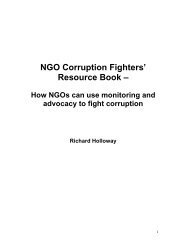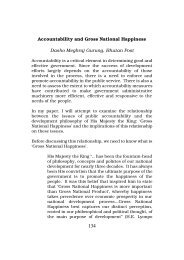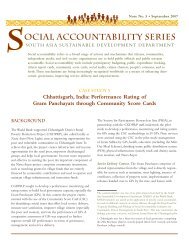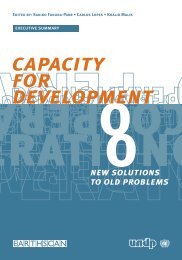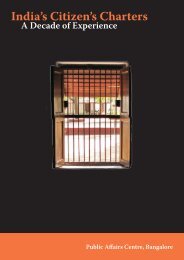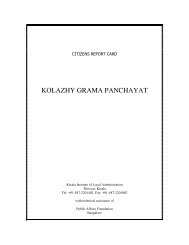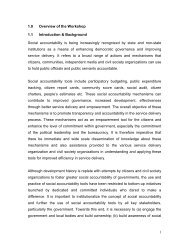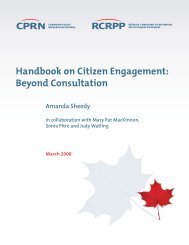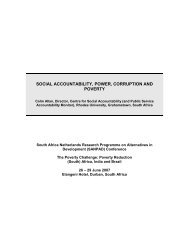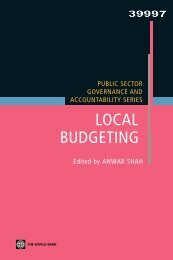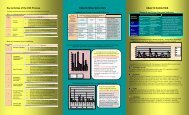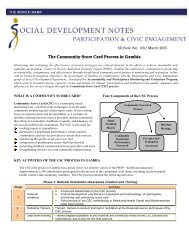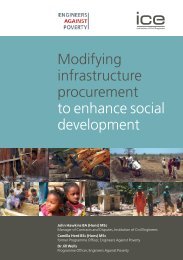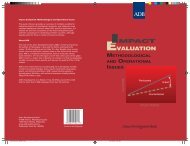Enabling Environment for Social Accountability in ... - SASANet
Enabling Environment for Social Accountability in ... - SASANet
Enabling Environment for Social Accountability in ... - SASANet
Create successful ePaper yourself
Turn your PDF publications into a flip-book with our unique Google optimized e-Paper software.
PART II. Key Aspects of the Mongolian Country Context 15<br />
2.1 OVERVIEW OF MONGOLIA’S POLITICAL,<br />
ECONOMIC, LEGAL, AND SOCIOCULTURAL CONTEXT<br />
S<strong>in</strong>ce 1990, Mongolia has undergone a rapid economic and political transition from be<strong>in</strong>g an authoritarian<br />
socialist regime with a centrally planned economy to a democracy with a market-based economy.<br />
However, corruption <strong>in</strong> key sectors has underm<strong>in</strong>ed its economic per<strong>for</strong>mance and political re<strong>for</strong>ms. In<br />
addition, economic and environmental factors, comb<strong>in</strong>ed with relaxation <strong>in</strong> state control of <strong>in</strong>ternal<br />
migration, have contributed to a dramatic <strong>in</strong>crease <strong>in</strong> urban migration, particularly to the capital city,<br />
which now constitutes approximately half of the Mongolian population. Although Mongolia’s legal<br />
regime is relatively conducive to civic engagement and social accountability, there rema<strong>in</strong> problematic<br />
areas with<strong>in</strong> its legal and regulatory codes as well as <strong>in</strong>efficiencies <strong>in</strong> implementation, some result<strong>in</strong>g<br />
from Mongolia’s socialist legacy.<br />
2.1.1 Political Institutions<br />
Mongolia fares well across several governance <strong>in</strong>dicators. At a global as well as regional level, World<br />
Bank <strong>in</strong>dicators suggest that Mongolia has above-average levels of political stability; slightly aboveaverage<br />
levels of voice, accountability and rule of law; though only average levels of government<br />
effectiveness, regulatory quality, and corruption control (Kaufman 2003). Moreover, the annual Freedom<br />
House survey rank<strong>in</strong>g political freedom and civil liberties <strong>in</strong> countries throughout the world, classifies<br />
Mongolia as “free.” Mongolians currently enjoy most civil and political freedoms: dissent<strong>in</strong>g views are<br />
regularly expressed and tolerated, and government <strong>in</strong>tervention is largely absent from everyday personal<br />
life (Freedom House 2005). The <strong>in</strong>dicator on which Mongolia is comparatively weak is the Corruption<br />
Perception Index of Transparency International, which currently ranks Mongolia eighty-fifth out of 147<br />
countries, on par with Romania and the Dom<strong>in</strong>ican Republic (Transparency International 2005).<br />
S<strong>in</strong>ce its <strong>in</strong>itial transition, the country has moved toward the establishment of democratic laws and<br />
<strong>in</strong>stitutions. The 1992 Constitution created a semi-parliamentary system with a unicameral parliament and<br />
a prime m<strong>in</strong>ister-led dual executive branch. The president exercises little power other than an advisory<br />
veto over legislation. Nonetheless, this provision has resulted <strong>in</strong> revisions to pend<strong>in</strong>g legislation <strong>in</strong> recent<br />
years such as the public broadcast law adopted <strong>in</strong> 2005 (see part 3.2 and annex 5 on the media). In<br />
addition to the dual executive, the Mongolian Constitution promotes a balance of power among the<br />
executive, legislative, and judicial branches of government. The Constitution also recognizes the<br />
“supreme objective of build<strong>in</strong>g a humane, civil, and democratic society <strong>in</strong> the country,” and explicitly<br />
guarantees basic civil rights, <strong>in</strong>clud<strong>in</strong>g freedom of expression, assembly, and association, as well as the<br />
right to own property. 16<br />
Follow<strong>in</strong>g the transition to a multiparty democracy <strong>in</strong> 1992, Mongolia has held relatively free and fair<br />
elections regularly, with several peaceful transfers of political power between parties. However,<br />
accord<strong>in</strong>g to a prelim<strong>in</strong>ary draft of the CIVICUS report on civil society <strong>in</strong> Mongolia (2006), “the 2004<br />
15 The overview of the country context and Mongolian civil society draws heavily on two academic sources (Kaplonski 2004 and<br />
Rossabi 2005) and the prelim<strong>in</strong>ary CIVICUS report (2006), as well as several reports by the <strong>in</strong>ternational donor community. See<br />
<strong>in</strong>ter alia reports by Asian Development Bank (2004a), UNDP (2000), and the World Bank (2003b, 2005a).<br />
16 Mongolian political and economic <strong>in</strong>stitutions have weathered recent changes <strong>in</strong> land tenure laws that <strong>in</strong>itially created a great<br />
deal of popular dissatisfaction and political <strong>in</strong>stability.



